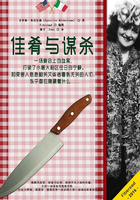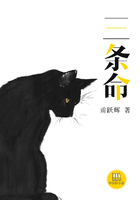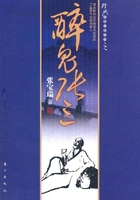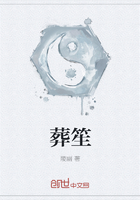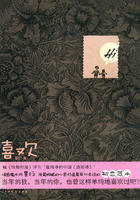In spite of the success which was beginning to materialize outside France, the two friends found their financial position very slow in mending. Every now and then there recurred moments of penury when they were obliged to go without food. They made up for it by eating twice as much as they needed when they had money. But, on the whole, it was a trying existence.
For the time being they were in the period of the lean kine. Christophe had stayed up half the night to finish a dull piece of musical transcription for Hecht: he did not get to bed until dawn, and slept like a log to make up for lost time. Olivier had gone out early: he had a lecture to give at the other end of Paris. About eight o'clock the porter came with the letters, and rang the bell. As a rule he did not wait for them to come, but just slipped the letters under the door. This morning he went on knocking. Only half awake, Christophe went to the door growling: he paid no attention to what the smiling, loquacious porter was saying about an article in the paper, but just took the letters without looking at them, pushed the door to without closing it, went to bed, and was soon fast asleep once more.
An hour later he woke up with a start on hearing some one in his room: and he was amazed to see a strange face at the foot of his bed, a complete stranger bowing gravely to him. It was a journalist, who, finding the door open, had entered without ceremony. Christophe was furious, and jumped out of bed:
"What the devil are you doing here?" he shouted.
He grabbed his pillow to hurl it at the intruder, who skipped back. He explained himself. A reporter of the Nation wished to interview M. Krafft about the article which had appeared in the Grand Journal.
"What article?"
"Haven't you read it?"
The reporter began to tell him what it was about.
Christophe went to bed again. If he had not been so sleepy he would have kicked the fellow out: but it was less trouble to let him talk. He curled himself up in the bed, closed his eyes, and pretended to be asleep. And very soon he would really have been off, but the reporter stuck to his guns, and in a loud voice read the beginning of the article. At the very first words Christophe pricked up his ears. M. Krafft was referred to as the greatest musical genius of the age. Christophe forgot that he was pretending to be asleep, swore in astonishment, sat up in bed, and said:
"They are mad! Who has been pulling their legs?"
The reporter seized the opportunity, and stopped reading to ply Christophe with a series of questions, which he answered unthinkingly. He had picked up the paper, and was gazing in utter amazement at his own portrait, which was printed as large as life on the front page: but he had no time to read the article, for another journalist entered the room. This time Christophe was really angry. He told them to get out: but they did not comply until they had made hurried notes of the furniture in the room, and the photographs on the wall, and the features of the strange being who, between laughter and anger, thrust them out of the room, and, in his nightgown, took them to the door and bolted it after them.
But it was ordained that he should not be left in peace that day. He had not finished dressing when there came another knock at the door, a prearranged knock which was only known to a few of their friends. Christophe opened the door, and found himself face to face with yet another stranger, whom he was just about to dismiss in a summary fashion, when the man protested that he was the author of the article… How are you to get rid of a man who regards you as a genius! Christophe had grumpily to submit to his admirer's effusions. He was amazed at the sudden notoriety which had come like a bolt from the blue, and he wondered if, without knowing it, he had had a masterpiece produced the evening before. But he had no time to find out. The journalist had come to drag him, whether he liked it or not, there and then, to the offices of the paper where the editor, the great Arsène Gamache himself, wished to see him: the car was waiting downstairs. Christophe tried to get out of it: but, in spite of himself, he was so na?vely responsive to the journalist's friendly protestations that in the end he gave way.
Ten minutes later he was introduced to a potentate in whose presence all men trembled. He was a sturdy little man, about fifty, short and stout, with a big round head, gray hair brushed up, a red face, a masterful way of speaking, a thick, affected accent, and every now and then he would break out into a choppy sort of volubility. He had forced himself on Paris by his enormous self-confidence. A business man, with a knowledge of men, na?ve and deep, passionate, full of himself, he identified his business with the business of France, and even with the affairs of humanity. His own interests, the prosperity of his paper, and the salus publica, all seemed to him to be of equal importance and to be narrowly associated. He had no doubt that any man who wronged him, wronged France also: and to crush an adversary, he would in perfectly good faith have overthrown the Government. However, he was by no means incapable of generosity. He was an idealist of the after-dinner order, and loved to be a sort of God Almighty, and to lift some poor devil or other out of the mire, by way of demonstrating the greatness of his power, whereby he could make something out of nothing, make and unmake Ministers, and, if he had cared to, make and unmake Kings. His sphere was the universe. He would make men of genius, too, if it so pleased him.
That day he had just "made" Christophe.
*****
It was Olivier who in all innocence had belled the cat.
Olivier, who could do nothing to advance his own interests, and had a horror of notoriety, and avoided journalists like the plague, took quite another view of these things where his friend was in question. He was like those loving mothers, the right-living women of the middle-class, those irreproachable wives, who would sell themselves to procure any advantage for their rascally young sons.
Writing for the reviews, and finding himself in touch with a number of critics and dilettanti, Olivier never let slip an opportunity of talking about Christophe: and for some time past he had been surprised to find that they listened to him. He could feel a sort of current of curiosity, a mysterious rumor flying about literary and polite circles. What was its origin? Were there echoes of newspaper opinion, following on the recent performances of Christophe's work in England and Germany? It seemed impossible to trace it to any definite source. It was one of those frequent phenomena of those men who sniff the air of Paris, and can tell the day before, more exactly than the meteorological observatory of the tower of Saint-Jacques, what wind is blowing up for the morrow, and what it will bring with it. In that great city of nerves, through which electric vibrations pass, there are invisible currents of fame, a latent celebrity which precedes the actuality, the vague gossip of the drawing-rooms, the nescio quid majus nascitur Iliade, which, at a given moment, bursts out in a puffing article, the blare of the trumpet which drives the name of the new idol into the thickest heads. Sometimes that trumpet-blast alienates the first and best friends of the man whose glory it proclaims. And yet they are responsible for it.
So Olivier had a share in the article in the Grand Journal. He had taken advantage of the interest displayed in Christophe, and had carefully stoked it up with adroitly worded information. He had been careful not to bring Christophe directly into touch with the journalists, for he was afraid of an outburst. But at the request of the Grand Journal he had slyly introduced Christophe to a reporter in a café without his having any suspicion. All these precautions only pricked curiosity, and made Christophe more interesting. Olivier had never had anything to do with publicity before: he had not stopped to consider that he was setting in motion a machine which, once it got going, it was impossible to direct or control.
He was in despair when, on his way to his lecture, he read the article in the Grand Journal. He had not foreseen such a calamity. Above all, he had not expected it to come so soon. He had reckoned on the paper waiting to make sure and verify its facts before it published anything. He was too na?ve. If a newspaper takes the trouble to discover a new celebrity, it is, of course, for its own sake, so that its rivals may not have the honor of the discovery. It must lose no time, even if it means knowing nothing whatever about the person in question. But an author very rarely complains: if he is admired, he has quite as much understanding as he wants.
The Grand Journal, after setting out a few ridiculous stories about Christophe's struggles, representing him as a victim of German despotism, an apostle of liberty, forced to fly from Imperial Germany and take refuge in France, the home and shelter of free men,—(a fine pretext for a Chauvinesque tirade!)—plunged into lumbering praise of his genius, of which it knew nothing,—nothing except a few tame melodies, dating from Christophe's early days in Germany, which Christophe, who was ashamed of them, would have liked to have seen destroyed. But if the author of the article knew nothing at all about Christophe's work, he made up for it in his knowledge of his plans—or rather such plans as he invented for him. A few words let fall by Christophe or Olivier, or even by Goujart, who pretended to be well-informed, had been enough for him to construct a fanciful Jean-Christophe, "a Republican genius,—the great musician of democracy." He seized the opportunity to decry various contemporary French musicians, especially the most original and independent among them, who set very little store by democracy. He only excepted one or two composers, whose electoral opinions were excellent in his eyes. It was annoying that their music was not better. But that was a detail. And besides, his eulogy of these men, and even his praise of Christophe, was of not nearly so much account as his criticism of the rest. In Paris, when you read an article eulogizing a man's work, it is always as well to ask yourself:
"Whom is he decrying?"
Olivier went hot with shame as he read the paper, and said to himself:
"A fine thing I've done!"
He could hardly get through his lecture. As soon as he had finished he hurried home. What was his consternation to find that Christophe had already gone out with the journalists! He delayed lunch for him. Christophe did not return. Hours passed, and Olivier grew more and more anxious and thought:
"What a lot of foolish things they will make him say!"
About three o'clock Christophe came home quite lively. He had had lunch with Arsène Gamache, and his head was a little muzzy with the champagne he had drunk. He could not understand Olivier's anxiety, who asked him in fear and trembling what he had said and done.
"What have I been doing? I've had a splendid lunch. I haven't had such a good feed for a long time."
He began to recount the menu.
"And wine… I had wine of every color."
Olivier interrupted him to ask who was there.
"Who was there?… I don't know. There was Gamache, a little round man, true as gold: Clodomir, the writer of the article, a charming fellow: three or four journalists whom I didn't know, very jolly, all very nice and charming to me—the cream of good fellows."
Olivier did not seem to be convinced. Christophe was astonished at his small enthusiasm.
"Haven't you read the article?"
"Yes. I have. Have you read it?"
"Yes… That is to say, I just glanced at it. I haven't had time."
"Well: read it."
Christophe took it up. At the first words he spluttered.
"Oh! The idiot!" he said.
He roared with laughter.
"Bah!" he went on. "These critics are all alike. They know nothing at all about it."
But as he read farther he began to lose his temper: it was too stupid, it made him look ridiculous. What did they mean by calling him "a Republican musician"; it did not mean anything… Well, let the fib pass… But when they set his "Republican" art against the "sacristy art" of the masters who had preceded him,—(he whose soul was nourished by the souls of those great men),—it was too much…
"The swine! They're trying to make me out an idiot!…"
And then, what was the sense of using him as a cudgel to thwack talented French musicians, whom he loved more or less,—(though rather less than more),—though they knew their trade, and honored it? And—worst of all—with an incredible want of tact he was credited with odious sentiments about his country!… No, that, that was beyond endurance…
"I shall write and tell them so," said Christophe.
Olivier intervened.
"No, no," he said, "not now! You are too excited. Tomorrow, when you are cooler…"
Christophe stuck to it. When he had anything to say he could not wait until the morrow. He promised Olivier to show him his letter. The precaution was useful. The letter was duly revised, so as to be confined practically to the rectification of the opinions about Germany with which he had been credited, and then Christophe ran and posted it.
"Well," he said, when he returned, "that will save half the harm being done: the letter will appear to-morrow."
Olivier shook his head doubtfully. He was still thoughtful, and he looked Christophe straight in the face, and said:
"Christophe, did you say anything imprudent at lunch?"
"Oh no," said Christophe with a laugh.
"Sure?"
"Yes, you coward."
Olivier was somewhat reassured. But Christophe was not. He had just remembered that he had talked volubly and unguardedly. He had been quite at his ease at once. It had never for a moment occurred to him to distrust any of them: they seemed so cordial, so well-disposed towards him! As, in fact, they were. We are always well-disposed to people when we have done them a good turn, and Christophe was so frankly delighted with it all that his joy infected them. His affectionate easy manners, his jovial sallies, his enormous appetite, and the celerity with which the various liquors vanished down his throat without making him turn a hair, were by no means displeasing to Arsène Gamache, who was himself a sturdy trencherman, coarse, boorish, and sanguine, and very contemptuous of people who had ill-health, and those who dared not eat and drink, and all the sickly Parisians. He judged a man by his prowess at table. He appreciated Christophe. There and then he proposed to produce his Gargantuaas an opera at the Opéra.—(The very summit of art was reached for these bourgeois French people in the production on the stage of theDamnation of Faust, or the Nine Symphonies.)—Christophe, who burst out laughing at the grotesqueness of the idea, had great difficulty in preventing him from telephoning his orders to the directors of the Opéra, or the Minister of Fine Arts.—(If Gamache were to be believed, all these important people were apparently at his beck and call.)—And, the proposal reminding him of the strange transmutation which had taken place in his symphonic poem, David, he went so far as to tell the story of the performance organized by Deputy Roussin to introduce his mistress to the public. Gamache, who did not like Roussin, was delighted: and Christophe, spurred on by the generous wines and the sympathy of his hearers, plunged into other stories, more or less indiscreet, the point of which was not lost on those present. Christophe was the only one to forget them when the party broke up. And now, on Olivier's question, they rushed back to his memory. He felt a little shiver run down his spine. For he did not deceive himself: he had enough experience to know what would happen: now that he was sober again he saw it as clearly as though it had actually happened: his indiscretions would be twisted and distorted, and scattered broadcast as malicious blabbing, his artistic sallies would be turned into weapons of war. As for his letter correcting the article, he knew as well as Olivier how much that would avail him: it is a waste of ink to answer a journalist, for he always has the last word.
Everything happened exactly to the letter as Christophe had foreseen it would. His indiscretions were published, his letter was not. Gamache only went so far as to write to him that he recognized the generosity of his feelings, and that his scruples were an honor to him: but he kept his scruples dark: and the falsified opinions attributed to Christophe went on being circulated, provoking biting criticism in the Parisian papers, and later in Germany, where much indignation was felt that a German artist should express himself with so little dignity about his country.
Christophe thought he would be clever, and take advantage of an interview by the reporter of another paper to protest his love for the Deutsches Reich, where, he said, people were at least as free as in the French Republic.—He was speaking to the representative of a Conservative paper, who at once credited him with anti-Republican views.
"Better and better!" said Christophe. "But what on earth has my music to do with politics?"
"It is usual with us," said Olivier. "Look at the battles that have taken place over Beethoven. Some people will have it that he was a Jacobin, others a mountebank, others still a Père Duchesne, and others a prince's lackey."
"He'd knock their heads together."
"Well, do the same."
Christophe only wished he could. But he was too amiable with people who were friendly towards him. Olivier never felt happy when he left him alone. For they were always coming to interview him: and it was no use Christophe promising to be guarded: he could not help being confidential and unreserved. He said everything that came into his head. Women journalists would come and make a fuss of him, and get him to talk about his sentimental adventures. Others would make use of him to speak ill of such-an-one, or so-and-so. When Olivier came in he would find Christophe utterly downcast.
"Another howler?" he would ask.
"Of course," Christophe would reply in despair.
"You are incorrigible!"
"I ought to be locked up… But I swear that it is the last time."
"Yes, I know. Until the next…"
"No. This really is the last."
Next day Christophe said triumphantly to Olivier:
"Another one came to-day. I shut the door in his face."
"Don't go too far," said Olivier. "Be careful with them. 'This animal is dangerous.' He will attack you if you defend yourself… It is so easy for them to avenge themselves! They can twist the least little thing you may have said to their uses."
Christophe drew his hand across his forehead:
"Oh! Good Lord!"
"What's the matter?"
"When I shut the door in his face I told…"
"What?"
"The Emperor's joke."
"The Emperor's?"
"Yes. His or one of his people's…"
"How awful! You'll see it to-morrow on the front page!"
Christophe shuddered. But, next day, what he saw was a description of his room, which the journalist had not seen, and a report of a conversation which he had not had with him.
The facts were more and more embellished the farther they spread. In the foreign papers they were garnished out of all recognition. Certain French articles having told how in his poverty he had transposed music for the guitar, Christophe learned from an English newspaper that he had played the guitar in the streets. He did not only read eulogies. Far from it. It was enough for Christophe to have been taken up by the Grand Journal, for him to be taken to task by the other papers. They could not as a matter of dignity allow the possibility of a rival's discovering a genius whom they had ignored. Some of them were rabid about it. Others commiserated Christophe on his ill-luck. Goujart, annoyed at having the ground cut away from under his feet, wrote an article, as he said, to set people right on certain points. He wrote familiarly of his old friend Christophe, to whom, when he first came to Paris, he had been guide and comforter: he was certainly a highly gifted musician, but—(he was at liberty to say so, since they were friends)—very deficient in many ways, ill-educated, unoriginal, and inordinately vain; so absurdly to flatter his vanity, as had been done, was to serve him but ill at a time when he stood in need of a mentor who should be wise, learned, judicious, benevolent, and severe, etc.—(a fancy portrait of Goujart).—The musicians made bitter fun of it all. They affected a lofty contempt for an artist who had the newspapers at his back: and, pretending to be disgusted with the vulgum pecus, they refused the presents of Artaxerxes, which were not offered them. Some of them abused Christophe: others overwhelmed him with their commiseration. Some of them—(his colleagues)—laid the blame on Olivier.—They were only too glad to pay him out for his intolerance and his way of holding aloof from them,—rather, if the truth were known, from a desire for solitude than from scorn of any of them. But men are least apt to pardon those who show that they can do without them.—Some of them almost went so far as to hint that he had made money by the articles in the Grand Journal. There were others who took upon themselves to defend Christophe against him: they appeared to be broken-hearted at Olivier's callousness in dragging a sensitive artist, a dreamer, ill-equipped for the battle of life,—Christophe,—into the turmoil of the market-place, where he could not but be ruined: for they regarded Christophe as a little boy not strong enough in the head to be allowed to go out alone. The future of this man, they said, was being ruined, for, even if he were not a genius, such good intentions and such tremendous industry deserved a better fate, and he was being intoxicated with incense of an inferior brand. It was a great pity. Why could they not leave him in his obscurity to go on working patiently for years?
Olivier might have had the answer pat:
"A man must eat to work. Who will give him his bread?"
But that would not have abashed them. They would have replied with their magnificent serenity:
"That is a detail. An artist must suffer. And what does a little suffering matter?"
Of course, they were men of the world, quite well off, who professed these Stoic theories. As the millionaire once said to the simple person who came and asked him to help a poverty-stricken artist:
"But, sir, Mozart died of poverty."
They would have thought it very bad taste on Olivier's part if he had told them that Mozart would have asked nothing better than to go on living, and that Christophe was determined to do so.
*****
Christophe was getting heartily sick of the vulgar tittle-tattle. He began to wonder if it were going on forever.—But it was all over in a fortnight. The newspapers gave up talking about him. However, he had become known. When his name was mentioned, people said, not:
"The author of David or Gargantua," but:
"Oh yes! The Grand Journal man!…"
He was famous.
Olivier knew it by the number of letters that came for Christophe, and even for himself, in his reflected glory: offers from librettists, proposals from concert-agents, declarations of friendship from men who had formerly been his enemies, invitations from women. His opinion was asked, for newspaper inquiries, about anything and everything: the depopulation of France, idealist art, women's corsets, the nude on the stage,—and did he believe that Germany was decadent, or that music had reached its end, etc., etc. They used to laugh at them all. But, though he laughed, lo and behold! Christophe, that Huron, steadily accepted the invitations to dinner! Olivier could not believe his eyes.
"You?" he said.
"I! Certainly," replied Christophe jeeringly. "You thought you were the only man who could go and see the beautiful ladies? Not at all, my boy! It's my turn now. I want to amuse myself!"
"You? Amuse yourself? My dear old man!"
The truth was that Christophe had for so long lived shut up in his own room that he felt a sudden longing to get away from it. Besides, he took a na?ve delight in tasting his new fame. He was terribly bored at parties, and thought the people idiotic. But when he came home he used to take a malicious pleasure in telling Olivier how much he had enjoyed himself. He would go to people's houses once, but never again: he would invent the wildest excuses, with a frightful want of tact, to get out of their renewed invitations. Olivier would be scandalized, and Christophe would shout with laughter. He did not go to their houses to spread his fame, but to replenish his store of life, his collection of expressions and tones of voice—all the material of form, and sound, and color, with which an artist has periodically to enrich his palette. A musician does not feed only on music. An inflection of the human voice, the rhythm of a gesture, the harmony of a smile, contain more suggestion of music for him that another man's symphony. But it must be said that the music of faces and human souls is as stale and lacking in variety in polite society as the music of polite musicians. Each has a manner and becomes set in it. The smile of a pretty woman is as stereotyped in its studied grace as a Parisian melody. The men are even more insipid than the women. Under the debilitating influence of society, their energy is blunted, their original characters rot away and finally disappear with a frightful rapidity. Christophe was struck by the number of dead and dying men he met among the artists: there was one young musician, full of life and genius, whom success had dulled, stupefied, and wiped out of existence: he thought of nothing but swallowing down the flattery in which he was smothered, enjoying himself, and sleeping. What he would be like twenty years later was shown in another corner of the room, in the person of an old pomaded maestro, who was rich, famous, a member of all the Academies, at the very height of his career, and, though apparently he had nothing to fear and no more wires to pull, groveled before everything and everybody, and was fearful of opinion, power, and the Press, dared not say what he thought, and thought nothing at all—a man who had ceased to exist, showing himself off, an ass saddled with the relics of his own past life.
Behind all these artists and men of intellect who had been great, or might have been great, there was certain to be some woman preying upon them. They were all dangerous, both the fools and those who were by no means fools: both those who loved and those who loved themselves: the best of them were the worst: for they were all the more certain to snuff out the artist with their immoderate affection, which made them in all good faith try to domesticate genius, turn it to their own uses, drag it down, prune it, pare it down, scent it, until they had brought it into line with their sensibility, their petty vanity, their mediocrity, and the mediocrity of the world they lived in.



